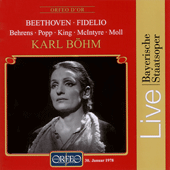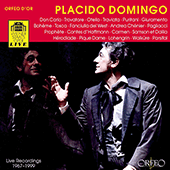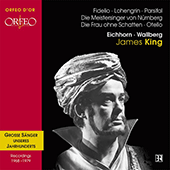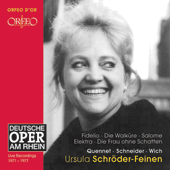Hildegard Behrens
Behrens’s father was a doctor and she herself graduated with a law degree from the University of Freiburg. As a child however she had learnt to play the violin, and after graduating decided to study voice with Ines Leuwen at the Freiburg Music High School. She made her formal operatic stage début as the Countess/Le nozze di Figaro at the Freiburg City Theatre in 1971, in the same year joining the opera studio of the Deutsche Oper am Rhein in Düsseldorf and in 1972 becoming a full member of that company. While at Düsseldorf, Behrens began to establish the repertoire for which she would later become word famous, singing rôles such as Agathe/Der Freischütz and Marie/Wozzeck. She also joined the Frankfurt Opera (in 1974) and appeared as a guest at other opera houses, for example at Zürich in 1975.
At this time Herbert von Karajan was looking to cast the title rôle in a forthcoming stage production and recording of Richard Strauss’s Salome. Behrens was asked to audition for him in Berlin and was subsequently contracted to sing Salome, with Karajan conducting, at the 1977 Salzburg Festival. Meanwhile during 1976 she had already made her début at Covent Garden as Leonore/Fidelio under Reginald Goodall and at the Metropolitan Opera as Giorgetta/Il tabarro, with James Levine in the pit.
The 1977 Salzburg performances of Salome launched Behrens as one of the world’s leading dramatic sopranos, with a career sustained at the highest level for over twenty years. She returned to Salzburg to sing Leonore under Karajan and the title rôle in Ariadne auf Naxos under Karl Böhm, with whom she sang Leonore at the Metropolitan in 1978. Other rôles which she later sang in New York included Electra/Idomeneo opposite Luciano Pavarotti in the title rôle (1982), Donna Anna / Don Giovanni (1984) and the title rôle in Tosca (1985), in addition to the familiar Wagner rôles. She sang the Empress / Die Frau ohne Schatten in Paris in 1980.
Having already sung Isolde at Zürich and Munich, Behrens was invited to sing the rôle under Leonard Bernstein in Munich during 1981 in separate performances of each act of Tristan und Isolde, forming the basis of live telecasts and a commercial recording. She sang Brünnhilde in the 1983 centenary production of the Ring at the Bayreuth Festival with Sir Georg Solti conducting and Sir Peter Hall directing, returning to repeat this rôle in subsequent cycles up to 1986. She went on to sing Brünnhilde internationally, receiving high critical praise for her London and Vienna cycles (to single out just two). She recorded the complete Ring with the Bavarian Sate Opera under Wolfgang Sawallisch and with the Metropolitan Opera under James Levine, the latter in both video and sound.
Having sung the title rôle in Elektra in Paris in 1987, this too became a signature rôle for Behrens, with noted performances in Athens, Berlin, London, Munich, New York and Vienna. She continued to expand her repertoire, singing Emilia Marty/The Makropoulos Case in Munich (1988), Senta/Der fliegende Holländer at the Savonlinna Festival (1989), and Katerina Ismailova/Lady Macbeth of Mtsensk at Munich in 1993. With Christoph Eschenbach in 1996 she sang Kundry/Parsifal in concert in Cologne (repeating this rôle on stage at Dresden during 2000–2001). Behrens gave the world premières of the song-cycle Le Cercle-Kleist, by the French composer René Koering, at Montpellier in 1995 and of Cronaca del luogo, an opera written for her by Luciano Berio, at the Salzburg Festival in 1999.
Even after the turn of the century she continued to extend her repertoire: in 2001 and 2004 she undertook the rôle of the Kostelnička/Jenůfa at the Salzburg Festival and at the Théâtre du Capitole, Toulouse, and in 2003 made her début as Ortrud/Lohengrin with the Norwegian Opera.
Behrens received numerous awards, including Kammersängerin of the Bavarian and Vienna State Operas, the Danish Léonie Sonnings Music Prize (1998), and the Lotte Lehmann Ring of the Vienna State Opera, awarded to her by a distinguished predecessor, Leonie Rysanek (1999). She was without question one of the most exciting singers of her generation. Her radiant voice evoked an immediate emotional response from audiences, and dramatically she was a convincing presence on stage. Since she was active at a time of growth in the recording industry, many of her matchless interpretations were caught under studio and live conditions, in both video and sound.
© Naxos Rights International Ltd. — David Patmore (A–Z of Singers, Naxos 8.558097-100).




















